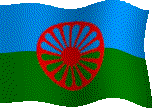The
Romany language, Romani chib,
or sometimes referred to as
Romanes (meaning "in the Roma manner"),
is difficult, if not
impossible for any Non-Roma to fully comprehend.
It is a mixture of
words taken from a wide variety of languages, and
often changing
the original meaning of the word with clear
purpose. As it is stated
above, the Rom hold their spoken language as
sacred, and consider
it a true defense against the Gaje. Normally even
the most skilled
linguistic finds it beautiful, but gibberish.
Often they will incorporate
the Romany into the native tongue of the land,
such as Greek or
Romanian. The loan words are however not always
easy to detect
because they undergo phonological changes, and
are provided with
proper affixes of the Rom's own language. The
land's native words
are "romanticized" as are loan words
from other languages.The following
lists are of words and phrases from the Romany
(not
to be confused with the Romanian) language. There
are literally
hundreds of various dialects, and none are
actually written down -
they are all oral, and each tribe has its own
distinct accent and
sometimes spelling, although they basically mean
the same thing.
This is due mainly to the fact that in each of
their "host" countries
the pronunciation is often used as the spelling
when it is written,
sometimes using grammar that is a mixture of both
Romany and
the "host" country's language. It can
get very confusing.
- Because
most travel frequently, the words and
phrases used by the
various tribes are often learned, and
thus there can be several
words which mean the same thing, with
only a slight difference in
the pronunciation. The sentence structure
is also unique, and it aids
in the confusion of the Gaje listeners.
Some phrases just do not
seem to even be able to translate into
English and retain much, if
any, of their original meaning. But, the
Roma understand the
meanings very well, even in a simple
two-word phrase, and they
hold this understanding closely guarded
next to their hearts.
It is
for this reason that I ask that people that
role-play, especially
with my characters, not use the language unless
they are playing
Rom characters, as even friends and lovers would
only know the
most common words such as "Prala",
and "Sastimos",
and what
a few simple phrases meant. It is not simply
another little dot under
linguistics on a sheet - it is the Rom's main
defense against the
outside world in an attempt to keep its culture
intact. The old "But
my character traveled with, lived with,
knew..." etc., just isn't
enough. Even friends and lovers, unless they are
Rom or forsake
the Gaje lifestyles and customs completely, and
marry into the Rom,
would not be taught the language in its true
form. Most tribes still
have severe penalties for "betraying The
People" in such a manner.
It is also currently on the International
List of Endangered
Languages, mostly because
of the reluctance of the Rom to divulge
much about the language itself to outsiders.
- Some
of the words are unique to certain
countries of tribes, and a
I have marked a few of them, although I
will try to do more of that
as I continue to research. Certain Rom,
say from Spain as opposed
to ones from Hungary would not normally
use the same phrasing.
For the moment, some of the words have
many varieties listed, and
at this time I do not have things indexed
out enough to list where
each originates. I normally place the
most common one first if that
is possible.
The
Romani spoken in Hungary is one of the purest
forms, and
there are also a few words, especially the words
and phrases used
by the "Tinkers" which originated from
Irish and Gaelic. Many
have their origins in the Hindu language, and
Latin, while there is
also a host of what is referred to as
"Modern Rom", or Gammon
which is almost a slang version. As soon as
possible, I will attempt
to separate these words from the others, making
it easier if you
happen to play an American Rom, or another who
would use the
more modern versions.
Bear
with me, because this is quite a task :o) - and
please be aware
that as much as I have tried to make certain that
what is here are
the correct things, no one outside of the Rom can
ever say what is
or is not completely true about them. I have
learned that even some
of the dictionaries available have many wrong
entries, having taken
some of the words from other lists and books
where it turned out
the authors had been misinformed.
- My
lists are set up under sections, instead
of strictly alphabetized.
Hopefully one day I will have an English
to Romani word list, which
will make looking particular things up
much easier. Until then, this
will have to do. I will be adding to each
page as I continue to get
the material in order, or as I find out
new things. (2/18/01)
|


